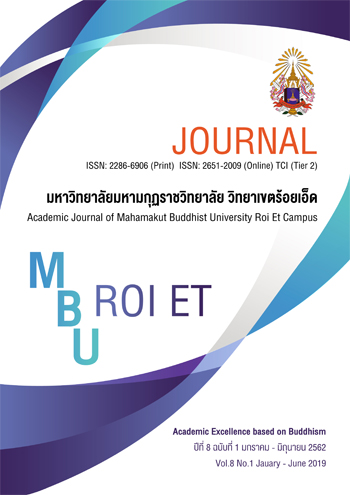An Application of the Four Principles of Brahmavihara by the Administrators of Sub-district Administrative Organizations in Nong Phok District, Roi Et Province
Main Article Content
Abstract
The thematic paper served the purposes: 1) to study personnel’s opinions on administrators’ applications of Brahmvihara, Buddhism’s Four Noble Sentiments, in their administrations at tambon administrative organizations in Nongphok district of Roi Et province, 2) to draw comparisons between the former’s opinions relevant to their differing genders, ages and educational levels and the latter’s applications as such to their administrations there, 3) to collect the former’s suggestions for enhancing the latter’s administrations there. Sampling groups comprised 204 personnel from eight tambon administrative organizations where they were working, earning them through Taro Yamane’s table. The device used for the research was the five-rating scale questionnaire with twenty questions, each of which possessed the reliability at .90. The statistics used for the research embraced: frequencies, percentages, means, standard deviations and F-tests (One-way ANOVA), processing them by making use of the software package.
Findings have found the following outcomes. 1) Administrators’ applications of four noble sentiments to their administrations at their administrative organizations have been rated ‘high’ in the overall aspect, as has one single aspect taken into account. Of aspects in the descending order of means, they include: Mudita, sympathetic joy; Karuna, compassion; Metta, loving kindness; and Upekkha, equanimity. 2) Hypothesis testing results have confirmed that personnel’s opinions on administrators’ applications of four noble sentiments their administrations do not vary. 3) The former’s suggestions for the latter’s applications have been offered in the descending order of three frequencies. Three key suggestions for enhancing their tasks are that administrators ought to i) openly look into personnel’s promotions with solid evidences, ii) admirably cite personnel’s prize winners for their outstanding performances, iii) express good wishes to personnel with an either expression more than it really is at present.
Article Details
References
จรัส สุวรรณมาลา. (2553). ปฏิรูประบบการคลัง : การกระจายอำนาจสู่ภูมิภาคและท้องถิ่น. กรุงเทพมหานคร : สำนักพิมพ์กองทุนสนับสนุนการวิจัย.
ชูวงศ์ ฉายะบุตร. (2547). การปกครองท้องถิ่นไทย. กรุงเทพมหานคร : บริษัท พิฆเณศพริ้นติ้ง.
พระพรหมคุณาภรณ์ (ป.อ. ปยุตฺโต). (2551). พจนานุกรมพุทธศาสตร์ ฉบับประมวล. พิมพ์ครั้งที่ 16.กรุงเทพมหานคร : โรงพิมพ์ เอส อาร์ พริ้นติ้ง แมสโปรดักส์.
วิเชียร บุญหล้า (2550). การใช้หลักพรหมวิหาร 4 ของผู้บริหารสถานศึกษาในสถานศึกษาขั้นพื้นฐาน สังกัดสำนักงานเขตพื้นที่การศึกษาสุรินทร์เขต 3. วิทยานิพนธ์ครุศาสตรมหาบัณฑิต สาขาวิชาการบริหารการศึกษา. คณะกรรมการบัณฑิตศึกษา : มหาวิทยาลัยราชภัฏสุรินทร์.
สมเด็จพระญาณสังวร (เจริญ สุวฑฺฒโน). (2527). พรหมวิหารธรรม. กรุงเทพมหานคร : สหายการพิมพ์.
สมเด็จพระมหาสมณเจ้ากรมพระยาวชญาณวโรรส. (2529). สารานุกรมพระพุทธศาสนา. กรุงเทพมหานคร : โรงพิมพ์มหามกุฏราชวิทยาลัย.
สัณหวิชญ์ สนิทวงศ์. (2550). การนำหลักพรหมวิหารธรรมไปใช้ในการปฏิบัติหน้าที่ของข้าราชการตำรวจฝ่ายป้องกันและปราบปราม : ศึกษาเฉพาะกรณีสถานีตำรวจอำเภอปากพนัง จังหวัดนครศรีธรรม. วิทยานิพนธ์ศาสนศาสตรมหาบัณฑิต. บัณฑิตวิทยาลัย : มหาวิทยาลัยมหามกุฏราชวิทยาลัย.
สำนักงานท้องถิ่นอำเภอหนองพอก. (2559). รายงานประจำปี. ร้อยเอ็ด : เอกสารอัดสำเนา.


